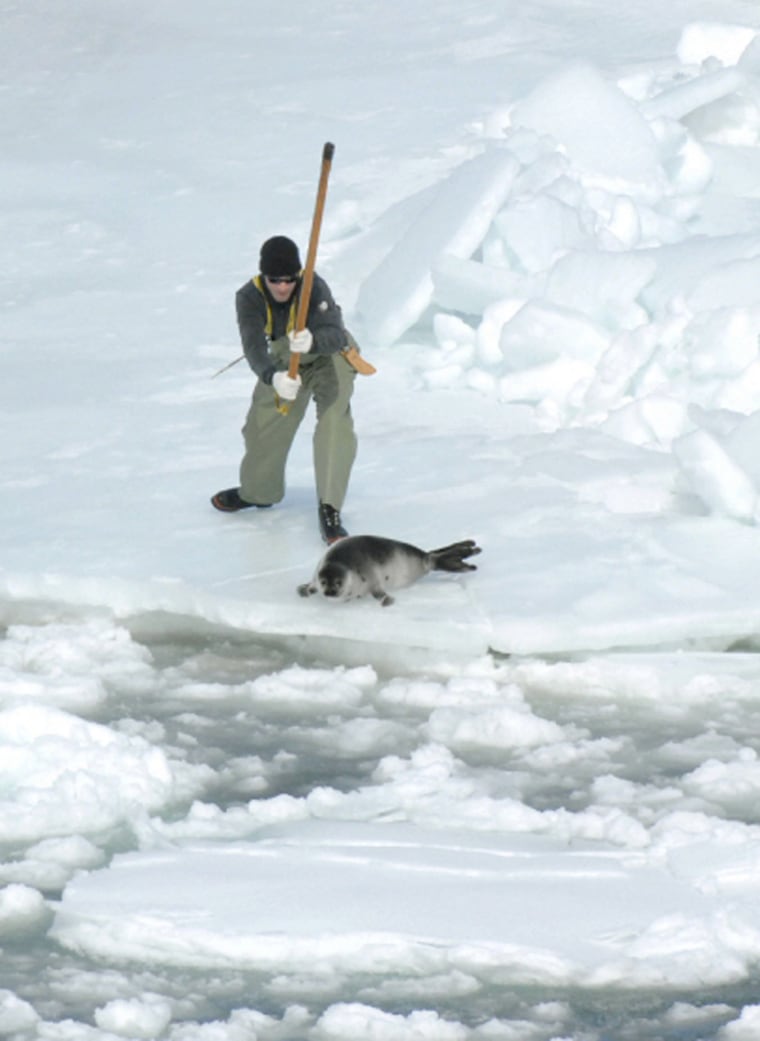The European Union proposed a total trade and import ban Wednesday on products from seals killed in a cruel way despite warnings it could hurt the world's largest annual seal hunt in Canada.
The plan announced Wednesday covers hunts worldwide, but focuses on Canada because of claims by anti-hunt campaigners that it is the cruelest. Canadian seal hunters use spiked clubs or hakapiks and rifles to kill seals.
The EU proposals says the trade in seal products would be allowed from countries that can offer guarantees their hunting techniques are "consistent with high animal-welfare standards" and the animals are killed swiftly without undue suffering.
The ban recommends a certificate and labels be provided by countries exporting seal products making clear seal products they trade meet strict EU conditions.
Proposal follows animal rights campaign
The proposal followed a campaign by animal rights groups and wrangling within the European Commission about how far it could go without sparking a complaint to the World Trade Organization by Canada and other hunting nations.
Canada has warned a ban could violate trade rules and threatened action if a ban was introduced. It claimed a ban would decimate isolated east coast communities that are heavily dependent on the annual hunt.
EU Environment Commissioner Stavros Dimas said he hoped the ban would be in place before the 2009 hunting season off Canada's East Coast.
"Seal products coming from countries which practice cruel hunting methods must not be allowed to enter the EU," Dimas told reporters.
"The images of seal hunting that circulate around the globe every year are the reminder of often times gruesome practices used to kill seals. European citizens find these practices repugnant and in contradiction to our standards of animal welfare."
Dimas said his office was flooded with thousands of e-mails and petitions demanding a ban, mainly from Britain, the United States and Canada.
Former French movie star turned animal activist Brigitte Bardot told The Associated Press that the "30-year-long battle ... is about to be won."
Exports total $5.5 million
Canada exported around $5.5 million worth of seal products such as pelts, meat, and oils to the EU in 2006.
However, the International Fund for Animal Welfare, or IFAW, said the ban should not include a loophole for humanely killed seals, saying it would be hard to define.
"Only a complete ban can prevent products from these large-scale and inherently cruel hunts from entering European markets," said Lesley O'Donnell, from IFAW.
Special exemptions will also be allowed for Canada's Arctic Inuit community.
This year's hunt was conducted under new rules, to appease European concerns, with extra steps added to make sure the animals are dead before they are skinned.
A ban would need the backing of the EU's 27 governments and the European Parliament before it could take effect.
Canada's East Coast seal hunt is the largest of its kind in the world, with an average annual kill of about 300,000 harp seals. The Canadian slaughter of some 335,000 seals in 2006 brought in around $25 million.
Several EU nations also conduct seal hunts, including Finland, Sweden and Britain. The largest markets are in Norway, China and Russia.
The EU has banned the import of white pelts from baby seals since 1983.
Several European Union nations, such as the Netherlands and Belgium, also have their own bans on all seal products. The United States has banned Canadian seal products since 1972.
